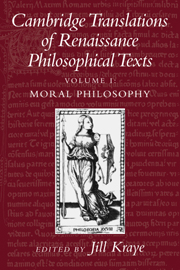Book contents
- Frontmatter
- Contents
- List of Translators
- Preface
- PART I CONCEPTS OF MAN
- 1 Anselm Turmeda
- 2 Poggio Bracciolini
- 3 Marsilio Ficino
- 4 Fernán Pérez de Oliva
- PART II ARISTOTELIAN ETHICS AND THE SUPREME GOOD
- PART III ARISTOTELIAN ETHICS AND CHRISTIANITY
- PART IV PLATONIC ETHICS
- PART V STOIC ETHICS
- PART VI EPICUREAN ETHICS
- Bibliography of Renaissance Moral Philosophy Texts Available in English
- Index Nominum
- Index Rerum
2 - Poggio Bracciolini
Published online by Cambridge University Press: 05 June 2012
- Frontmatter
- Contents
- List of Translators
- Preface
- PART I CONCEPTS OF MAN
- 1 Anselm Turmeda
- 2 Poggio Bracciolini
- 3 Marsilio Ficino
- 4 Fernán Pérez de Oliva
- PART II ARISTOTELIAN ETHICS AND THE SUPREME GOOD
- PART III ARISTOTELIAN ETHICS AND CHRISTIANITY
- PART IV PLATONIC ETHICS
- PART V STOIC ETHICS
- PART VI EPICUREAN ETHICS
- Bibliography of Renaissance Moral Philosophy Texts Available in English
- Index Nominum
- Index Rerum
Summary
Introduction
Poggio Bracciolini (1380–1459) was born in Terranuova, a small town in the upper Arno valley some thirty miles from Florence. Near the end of the fourteenth century he moved to Florence and qualified there as a notary in 1402. He is said by Vespasiano da Bisticci to have supported his studies by copying manuscripts, and his formal bookhand of the early fifteenth century is among the first, and certainly the most influential, examples of the new humanistic script. By this time he was a protégé of the humanist chancellor of Florence, Coluccio Salutati (see Chapter 16), and with Coluccio's support he found a place at the court of Rome, as a writer of apostolic letters and papal secretary, from 1403 onwards. He held this post, with interruptions, for half a century until he in turn became chancellor, and ultimately historian, of Florence, where he spent his last years.
Apart from his public career (which included an unhappy five years in England), Poggio made a name for himself in two distinct but connected fields of humanist enterprise. The two decades to about 1425 were marked by a prolonged, systematic and very successful search for older, better or more complete manuscripts of the Latin classics, hitherto unknown or unavailable. The search was one for which his position at the centre of the Church and his travels to ecclesiastical councils offered ample opportunity.
- Type
- Chapter
- Information
- Cambridge Translations of Renaissance Philosophical TextsMoral and Political Philosophy, pp. 17 - 28Publisher: Cambridge University PressPrint publication year: 1997
- 1
- Cited by



